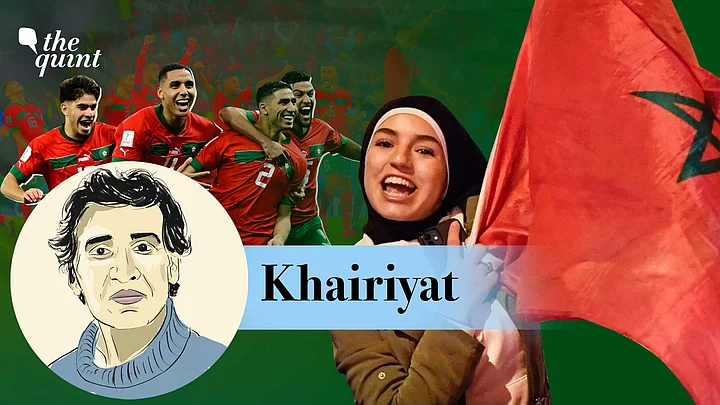Some of the most admirable displays in the recently-concluded soccer World Cup were by the Moroccan team which made history by reaching the semi-finals. There were many ways in which the success of this exceptional team was celebrated. One of them was the feeling, often tweeted and WhatsApped that the Moroccan team was representing the “Muslim world”.
It struck me that this is a peculiarly post-colonial position. The success of a European team is never seen by Europeans as the success of white people or of the ‘Christian world.’
There might be a handful of freak exceptions to this, but they are so far out that we can ignore them. You need to be from a post-colonial nation for the success of someone vaguely like you to be turned into a generic passport. I can recall times when Indians, for instance, have similarly celebrated the success of an Indian-origin person, often born and brought up elsewhere— even, as is the case of Kamala Harris, of mixed parentage.
Celebration of the Indian as a National Asset
Can one really consider the success of, say, a rich and highly privileged Indian born or educated in UK or USA to be an accomplishment for all Indians in India? Can one actually claim that Moroccan soccer players were making a point for Muslims in the world? When you stop thinking emotionally and look at the facts, you realise the childishness of such sweeping equations.
Let us start with India. With a population of 1,210,193,422 residents reported in the 2011 provisional census report, India is the world’s second-most populous country. As Indians, we do not need to be reminded of the hundreds of languages and dialects spoken by Indians and the dozens of religions that exist here. We also know that there are vast economic and cultural differences between its regions and states, and often even within the same region or state, and, at least, in terms of living standards, the same city or town.
There is, however, one reason for Indians to take pride in achievements of other Indians, at least as long as they are Indian citizens or have at least, lived their formative years in India.
The reason is that India is a nation-state. That is why our athletes compete under the national flag, and, hence, there is good reason for an Indian to take pride in their achievement, no matter whether the athletes are Hindus or Muslims, from Assam or Punjab. Whether we should take pride in the achievement of a Kamala Harris or a Rishi Sunak is another matter, of course, but we can certainly take pride in the achievements of an Indian citizen.
Does Moroccon Soccer Team Bear the Onus To Add to Muslim Community?
Now, let us look at the ‘Muslim world.’ A cursory glance at, say Wikipedia, informs us that there are 49 Muslim-majority nation-states in the world. When it comes to the percentage of the total population in a region considering themselves Muslim, it is 91% in Middle East-North Africa, 89% in Central Asia, 40% in Southeast Asia, 31% in South Asia, 30% in Sub-Saharan Africa, 25% in Asia-Oceania, 6% in Europe, and 1% in the Americas.
Despite the fact that Muslims talk of the ‘ummah’ or community of Muslims, the fact is, there are incredible cultural, linguistic, ethnic, political, economic, social, and even doctrinal differences between Muslims in different regions, and very often even in the same region.
So, while the idea that all Indians should take pride of the achievement of the Indian cricket team makes sense in a national-state context, the idea that the success of the Moroccan team was in some ways a contribution to the “Muslim world” is much more dubious. Or it would make sense only if one accepted, unlike me that a crime by an Islamist group is in some ways a reflection on all Muslims.
Can Faith & Football Be Kept Separate?
One can see why Muslims are sensitive about such matters, and why they feel the need to welcome the success of the Moroccan soccer team along such generic lines. After all, Muslims do not always get good press. Some of it is the fault of some of their groups and religious leaders, but some of it is also simply due to prejudices against Muslims.
So when something like the Moroccan soccer team comes along, many Muslims feel the urge to relate to it despite the fact that they share almost nothing with Morocco and its players, and that, despite Diego Maradona’s famous “hand of God”, soccer has nothing to do with religion.
It is an urge that seems to exist among other post-colonial people, including Indians, who feel that they have to somehow “speak back” to history. It is a dangerous urge. It prevents them from relating to the world as they should, and instead makes them hide behind “narrow, domestic walls.”
It enables the fanatics and fundamentalists among them to devise a narrow identity for them, and impose it on them, usually for the benefit of the fanatics and fundamentalists. And it enables those who are prejudiced against them to turn the tables at will: for if you can celebrate the win of the Moroccan team as a win for the “Muslim world,” then Islamophobes can also blame the next act of terror by a confused or criminal Muslim on all Muslims. There is no need to fall into that trap.
(Tabish Khair, is PhD, DPhil, Associate Professor, Aarhus University, Denmark. He tweets @KhairTabish. This is an opinion article and the views expressed are the author’s own. The Quint neither endorses nor is responsible for them.)
